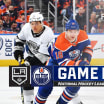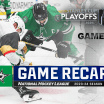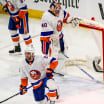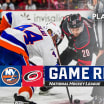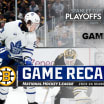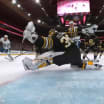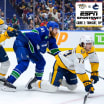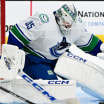The 2018 NHL Trade Deadline (3 p.m. ET; Feb. 26) is less than a week away. With that in mind, NHL.com is sitting down this month with some of the biggest names in the game. Today, Dallas Stars general manager Jim Nill talks about how much of a sellers' market it is this year -- and why the Stars won't overpay for deadline assets after all the moves they made last summer.
TORONTO -When it comes to roster overhauls, few NHL executives, if any, were busier than Dallas Stars general manager Jim Nill last summer.
Stars GM won't overpay for quick fix at Trade Deadline
After offseason overhaul, Nill says he's fine with standing pat unless prices drop
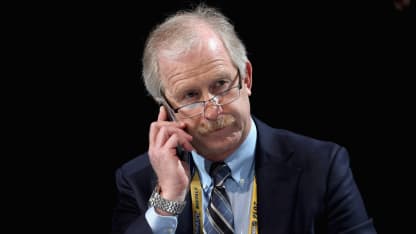
© Dave Sandford/Getty Images
Goaltender Ben Bishop, defenseman Marc Methot, forwards Alexander Radulov, Martin Hanzal and coach Ken Hitchcock each was brought in prior to this season, adding some much-needed talent and experience on the ice and behind the bench.
In Nill's mind, getting so much work done seven months ago has put him in a position of strength as the 2018 NHL Trade Deadline quickly approaches.
According to multiple reports, the Stars have inquired about forward Rick Nash of the New York Rangers, an unrestricted free agent come July 1. But Nill also understands the glut of buyers looking to add at the deadline makes this a sellers' market, resulting in some inflated asking prices the past few weeks.
Nill would like to make moves, but is comfortable at standing pat if the requested returns remain too lofty.
"Things are going to happen around the League as the days wind down to the deadline," Nill said. "It's just that the prices -- at least to me -- are still very high.
"From our point of view, I'm not actively looking, so it's kind of a moot point to me. I'm not giving up a high draft pick or a top prospect for a rental. I'm just not doing that. I like where our team is at, and I'm not at the stage where we're going to do that.
"Now things might change as the deadline gets closer. But I still think the prices are pretty high. I think most GMs think the prices are too high. But it seems like every year someone seems to pay it. That's just the business. That's just the way it is."
According to Nill, the return to action of Methot is the equivalent of bringing in much needed blue line experience at the deadline.
Methot, 32, has missed 41 games this season, primarily because of a knee injury. He returned to the Stars lineup last week.
"Our trade deadline, in many ways, was last July 1," Nill said. "We made something like five changes. Methot, for example, we haven't really had him all year and now he's coming back. We have eight healthy defensemen and a couple of guys in the minors I know I can bring up, so I know we have depth there. We have some good prospects in the minors. So I'm not desperate to make a move.
"I'm fortunate in that way. When I hear all these high prices, that's ok because I'm not going to get involved in that. I know there are other teams who are in different situations and I can't speak for them. I just know where our team is at."
The Stars are tied with the St. Louis Blues for third place in the Central Division; Dallas has two games in hand.
As Nill weighs the Stars' options ahead of the trade deadline, he took time to discuss a number of topics with NHL.com.
On why the trade market had been relatively inactive prior to this week
"The chatter is going to pick up because you have a set deadline on things. It becomes a time thing. Two weeks ago, teams weren't really sure where they're at. Now teams are at the point where they have just three or four games before the deadline, so they pretty much know where they are."
On why it is such a strong sellers' market
"We talk parity all the time now, and there are only so many teams that can make it. But there are so many teams right now fighting for spots this year. Realistically, every team wants to do something right now, but I just don't think we're part of that unless prices become more reasonable. Part of that, as I noted earlier, was July 1, when we made a lot of changes."
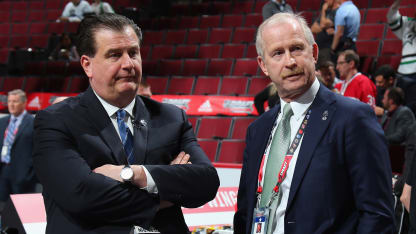
© Bruce Bennett/Getty Images
On the dangers of pursuing rental players
"It's a tough trade-off. You can say you made a move for your team now and that you gave your team the best chance. But then, all of a sudden, the door closes. And then you have to walk to the [NHL] Draft and sit at the table and you don't pick until No. 60 or 70. That's hard to take. It's an individual GM philosophy, but for me, that's really hard to take."
On his desire to make a 'hockey trade'
"A 'hockey trade' is the type of transaction where, for example, you've filled a hole you might be looking at next summer because you've traded for a guy at the deadline whose contract goes beyond this season. But a rental player is different. Look at the situation right now. There are probably eight teams right now that know they are in the playoffs and 10-12 others who really don't know where they are and are saying: 'Well, we might be in, we might be out.' All of a sudden, to wake up in April and realize you gave up first-round picks and something else and didn't make the playoffs, boy, that's hard to take. You have to be very careful. I always get back to the point of draft picks and developing young players. Well, if you're going to give those assets away, you are not going to have any. That's just my philosophy."
On how the addition of Bishop has made the Stars a more dangerous team
"I think right now, our goaltending situation as good as anyone's in the League. We're fortunate the way the cap space worked out for us. And now we have two No. 1 goalies. Bishop's outstanding play speaks for itself, and Kari Lehtonen has been great for us. I like our depth there. Realistically, we don't really have any gaping holes anywhere. Like every other team, we are looking to improve. That's my responsibility to do that. But I'm taking a long-term approach."
On how the Stars are buying what Hitchcock is selling
"Hitch has done a great job. The hardest part as a coach when you come into a new situation is you know how you want how to play. You have to sit down with players and educate them. Every day you have to stress: 'This is how we want to play.' Sometimes it takes a while for players to buy into that and the results aren't immediately evident. And unfortunately, we live in an immediate-results world. And if you don't have success right away, players start wondering if it's going to work. Now, do they revert back to their bad habits? That was Hitch's biggest challenge -- to get them to believe into it. And now they're starting to understand it. They know if they stick to the system, every game isn't going to be 1-0; there will be offensive opportunities. You're going to actually get more opportunities because you're going to wear the other team out."


